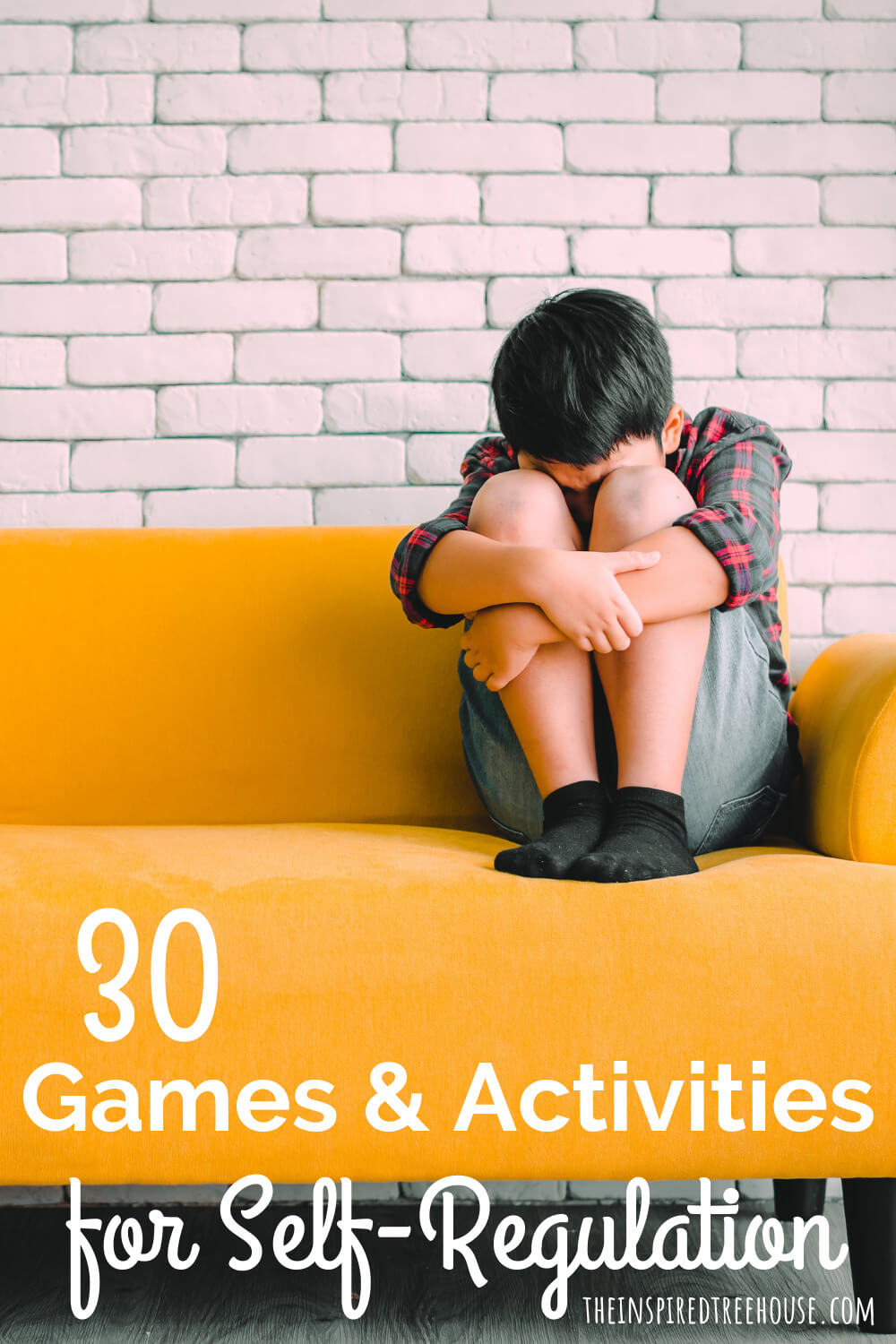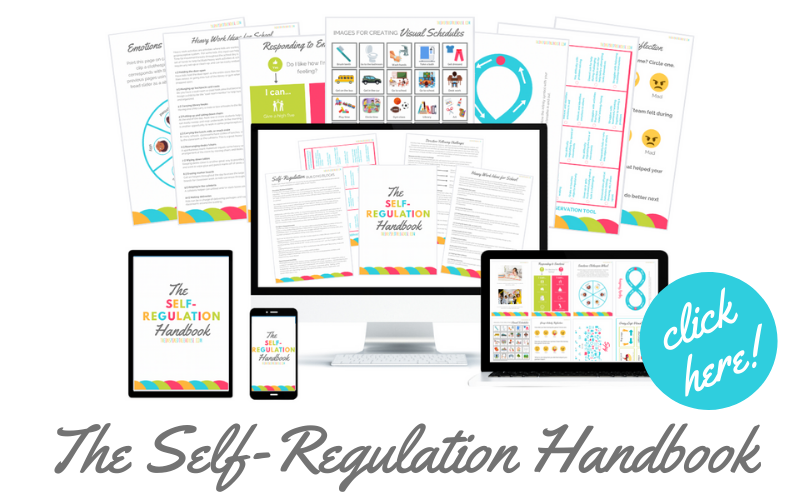How can you support the development of self-regulation in your child? Check out some of our best activities and ideas here!
This post contains affiliate links. Read more.
What is Self-Regulation?
When we talk about self-regulation in kids, we’re referring to the ability to maintain an arousal level that is appropriate for any given situation. Self-regulation also involves having the ability to generate appropriate behavioral and sensory responses to the input in different situations and daily routines and the ability to demonstrate self control: to monitor and control behavior, attention, motor output, emotions, and social interactions.
Self-regulation skills might include a child maintaining his composure and problem-solving or asking a caregiver for help or guidance when another child takes his toy or being able to self-monitor, control their impulses, and keep their voice quiet in the library. Self regulation in the classroom or school might include a child being able to attend and stay at his desk while the classroom teacher is talking or being able to stay with his class and walk in line in the hallway.
It sounds like a lot, doesn’t it? That’s because self-regulation is extremely complex. It involves cognition, the sensory systems, behavior…and so much more! Many children struggle with one or more of these areas, making self-regulation challenging. Children who are autistic, who have ADHD, or who need more sensory processing supports may struggle with self-regulation skills more than other kids. Toddlers and kids in the preschool years are still actively developing the ability to regulate themselves and may demonstrate outbursts and tantrums as part of typical development. But all of us – adults and children alike – can have difficulty with managing our own emotions and behaviors when faced with basic daily stressors like tiredness or hunger.
How can you support the development of self-regulation in your child? Check out some of our best activities and ideas here!
Scroll down to the bottom of this post for the free printable!
How Can You Tell if Your Child is Struggling With Self-Regulation?
Recognizing when kids have self-regulation concerns involves recognizing different patterns of behavior. Kids who are having difficulty with self-regulation may:
-Act overly silly or “out of control”
-Have tantrums or meltdowns
–Struggle with transitions between activities
-Have difficulty waiting or taking turns
-Struggle with being in close proximity to others (e.g. circle time)
-Demonstrate problems and frustration during social interactions (e.g. talking too loud, standing too close, touching others)
-Have difficulty walking or waiting in line
-Move too quickly or with too much force
-Grab or touch objects impulsively
How to Help Kids Develop Self-Regulation
Even though self-regulation can be a challenging skill for many children, self-regulation research has shown that games and fun activities can be effective in promoting better self-regulation and for children who are struggling.
It is also so important for kids to have caregivers who are able to maintain perspective, coach them through difficult situations, demonstrate empathy when kids are struggling with self-regulation, and form responsive relationships that foster kids’ self-regulation capacities and self-esteem.
Games and therapy tools that support planning and problem solving, patience, memory, attention, motor control, and sequencing can help kids develop the ability to self-regulate despite challenging situations and circumstances. Calming techniques, self-awareness exercises, and mindfulness activities can also be effective in supporting the development of self-regulation.
The following 30 games and activities can be great ways to introduce self regulation strategies with kids!
Scroll down to the bottom of this post for the free printable!
Games and Activities for Self-Regulation
The following 30 games and activities can be great ways to introduce and practice self-regulation and coping skills with kids and can even be used as self-regulation interventions during therapy sessions.
Click on the linked titles for more information and scroll down to the bottom of this post for the free printable!
1 || Red Light, Green Light
Spice it up with these fun light buzzers! And be sure to check out our post about variations on this classic game to promote self control in kids!
2 || Simon Says
Try this Simon Says parachute game for a different twist on this old classic.
3 || Partner Obstacle Course
This fun obstacle course for kids is a great way to encourage teamwork and social skills while also working on gross motor skills like balance and coordination!
4 || Duck Duck Goose
A great old classic for working on social interactions, waiting, and more!
5 || Freeze tag
This is an awesome one for working on self-regulation because kids have to wait perfectly still until their friends come to “unfreeze” them.
6 || Partner painting
Cooperative art activities for kids like Partner Painting are perfect for getting little ones to work together while also targeting visual motor and fine motor skills.
7 || Hide and seek
Can kids wait quietly in their hiding spots while their friends try to find them?
8 || Wacky Relay
Group games for kids like Wacky Relay are a great way to focus on social skills, teamwork, and gross motor skills!
9 || Freeze dance
Freeze Dance is so perfect to use in the classroom or at home to practice regulating movements and behavior.
10 || Musical Chairs
We love this idea for working with kids on coping when it’s their turn to be “out”. It can be a big challenge, but a good way to practice.
11 || Mirror Mirror
The Mirror Mirror game can be as simple, or as challenging as you make it and is a super fun way to address controlled movements and attention.
12 || Parachute play
Working together on controlling the parachute to play different games is awesome for working on self-regulation. Grab our favorite parachute here!
13 || “Counting Down” or Anticipation Activities
Try setting out a beanbag chair and helping the child wait by counting down – “3…2…1…JUMP!” and then jumping onto the bean bag chair. And then repeating the activity so the child knows to wait before jumping)
14 || Hand clapping games
Bilateral coordination, memory and cognitive skills, and cooperative play are all packed into these fun hand clapping songs and games – and they’ll also take you for a little stroll down memory lane!
15 || Hedbanz
Hedbanz is another fun game for working on self-regulation because kids have to resist the urge to yell out the picture on their friends’ headbands!
16 || Dancing
Kids love practicing their favorite fast and slow dance moves to different types of music – great for regulating speed of movements.
17 || Suspend
Suspend game is a great fine motor challenge and also challenges kids to regulate the force of their movements.
18 || Balloon volleyball
When kids play balloon volleyball, they have to learn how to slow their movements down in order to control the balloon and not let it go flying!
19 || Jenga
Slow, careful movements are the name of the game in Jenga and you can modify the blocks to include fun questions and other prompts to boost social interaction.
20 || Operation
We like the simple game of Operation for working with kids on coping with turn taking when they hit the buzzer on the pretend patient.
21 || Simon
Simon is great way to work on visual attention and memory, this old game is a great one for your classroom or therapy bag.
22 || Sequencing Motor Tasks
For example – do 3 jumps, then 2 hops, then stand on one foot for 3 seconds)
23 || Bop It
Like Simon, Bop It is great for working on memory, but also includes an auditory processing challenge and an opportunity to learn how to remain calm when kids make a mistake.
24 || Spot It
Spot It is a perfect game for addressing visual processing skills and also offers kids a chance to cope with “losing” because the rounds go fairly quickly so they can get back “in the game”.
25 || Breathing techniques
These calming deep breathing techniques for kids are great strategies for supporting self-regulation and calm behavior at home, in the classroom, and beyond! Grab the free printable breathing cards too!
26 || Guided meditation for kids
These 10 meditation resources are the perfect place to start if you want to try mindfulness activities and guided meditation for kids!
27 || Yoga
Mindful movement and mindful breathing are a great combination for supporting self-regulation. Try some yoga for kids in your classroom or during your next therapy session!
28 || Zones of Regulation
One of the most popular curriculums on the market for working on self-regulation, Zones of Regulation offers visual supports and practical activities for working on the skills kids need most to regulate themselves.
29 || Calming sensory strategies for school
You’ll want these calming techniques in your toolbox for addressing behaviors in the classroom setting.
30 || Calming sensory activities for community outings
And these awesome ideas are perfect for taking out into the community to practice self-regulation on the go!
Other Resources About Self-Regulation
1 || Developing Young Children’s Self-Regulation Through Everyday Experiences, National Association for the Education of Young Children. Ida Rose Florez
2 || Self-Regulation: A Cornerstone of Early Childhood Development. Linda Groves Gillespie and Nancy L. Seibel. National Association for the Education of Young Children.
3 || Executive Function & Self-Regulation. Center on the Developing Child, Harvard University.
4 || How Can We Help Kids With Self-Regulation? Child Mind Institute.
5 || Strategies for Teaching Kids Self-Regulation. PBS.
6 || Self-Regulation Research: A Simple Overview

Latest posts by Claire Heffron (see all)
- Pro Tips for Conquering Toddler Separation Anxiety - April 25, 2024
- Cute Zipper Bags for Therapists - April 18, 2024
- Fairy Tale Games and Toys - April 12, 2024



[…] 30 games for self-regulation […]